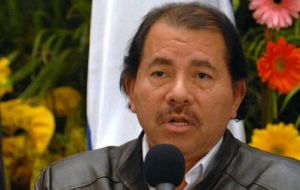MercoPress. South Atlantic News Agency
Nicaraguan Supreme Court opens the way for re-election of President Ortega
 Daniel Ortega joins a growing the club of Latinamerican presidents
Daniel Ortega joins a growing the club of Latinamerican presidents The Nicaraguan Supreme Court has lifted a constitutional ban on re-election, clearing the way for President Daniel Ortega to run again in 2011 elections. The court's decision followed an appeal by Mr Ortega and a group of mayors.
In July, Mr Ortega said publicly he favoured allowing people the right to seek consecutive terms.
The issue of presidential term limits is controversial across Latinamerica, where several nations have moved to allow consecutive terms in office.
The argument in favour is that, in the modern world, continuity over more than four years is needed if effective policies for change are to be enacted. But ending term limits is a divisive subject in a region which saw long-running military dictatorships hold sway for much of the 20th Century.
Latin American countries are increasingly wrestling with the issue of presidential term limits as populists such as Venezuela's self-styled Bolivarian Socialist President Hugo Chavez seek to stay in power as long as they can win elections.
In January, Chavez ally Evo Morales of Bolivia won a referendum to let him run for another five-year term. Ecuador's President Rafael Correa has also engineered constitutional changes to let him hold office for two more four-year terms.
However Costa Rican President Oscar Arias, a Nobel Peace Prize winner, (and a close ally of the US) is serving a second term thanks to a constitutional change and Colombian President Alvaro Uribe may seek a third term after a similar move allowed him a second term.
Monday's ruling by the constitutional branch of the Nicaraguan Supreme Court was in response to a petition by Mr Ortega and a group of more than 100 mayors.
Six justices, all regarded as supporters of Mr Ortega's Sandinista party, determined that the constitutional ban on allowing re-election was “unenforceable”. The electoral court indicated it would accept the ruling.
Opposition politicians and jurists condemned the Supreme Court's decision as illegal.
Amid celebrations to mark the 30th anniversary of the Sandinista revolution in July, Ortega said that the country should end term limits, as “all should have the right to stand for re-election and be rewarded or punished by the popular vote”.
At the time, it was thought constitutional change would have to be approved by the National Assembly, where Ortega does not have a majority, or be backed in a public referendum.
Ortega first came to power in 1979 after his Sandinista National Liberation Front (FSLN) ousted the dictator Anastasio Somoza. He was elected president in 1984 and served until 1990. Mr Ortega returned to the presidency after winning the 2006 elections.
A clause from the 1995 constitution bars presidents from running consecutively or serving more than two terms.




Top Comments
Disclaimer & comment rulesCommenting for this story is now closed.
If you have a Facebook account, become a fan and comment on our Facebook Page!